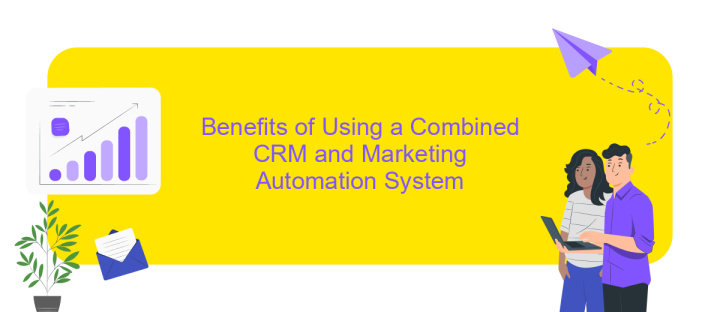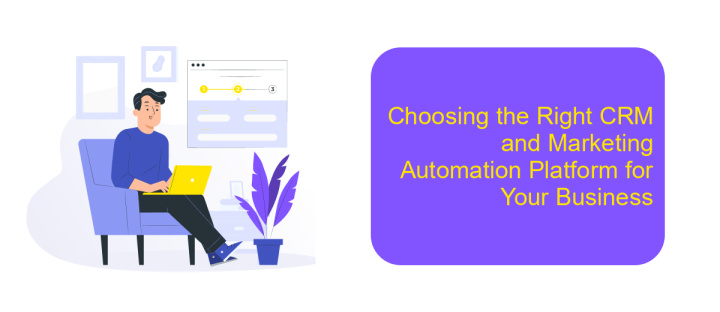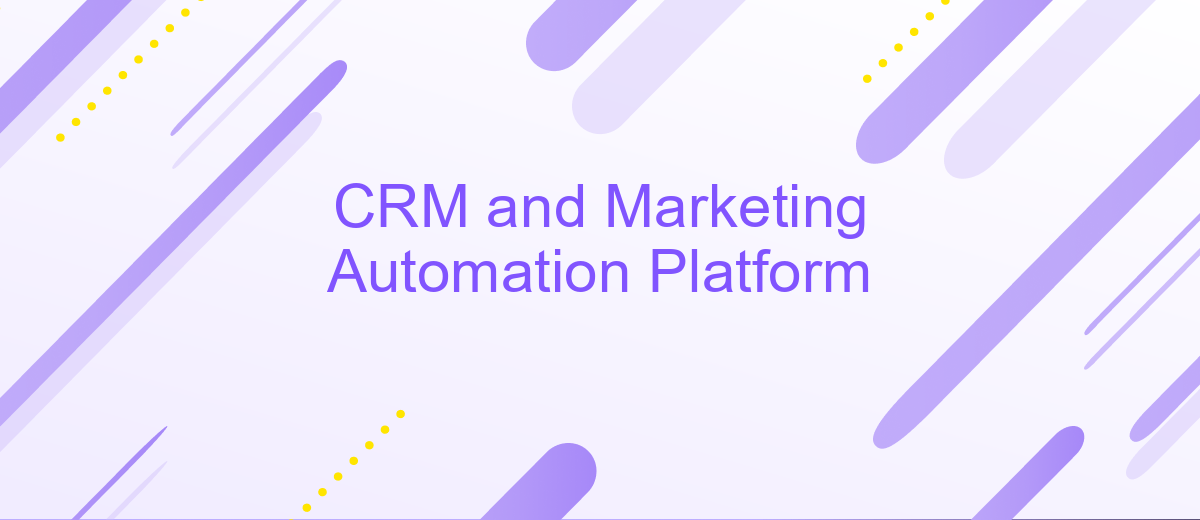CRM and Marketing Automation Platform
In today's rapidly evolving digital landscape, businesses are increasingly turning to CRM and marketing automation platforms to streamline their operations and enhance customer engagement. These powerful tools not only help in managing customer relationships but also automate repetitive marketing tasks, allowing companies to focus on strategic growth. By integrating CRM with marketing automation, businesses can achieve a more personalized and efficient approach to customer interaction, driving both satisfaction and loyalty.
Understanding the Power of CRM and Marketing Automation Integration
Integrating CRM and marketing automation platforms can revolutionize how businesses engage with their customers. By combining the strengths of both systems, companies can streamline their operations, enhance customer experiences, and drive revenue growth. CRM systems focus on managing customer relationships and storing valuable data, while marketing automation platforms enable efficient, targeted marketing campaigns. Together, they provide a holistic view of customer interactions and preferences, allowing businesses to tailor their strategies effectively.
- Improved customer segmentation and targeting
- Enhanced lead nurturing and conversion rates
- Streamlined sales and marketing alignment
- Comprehensive analytics and reporting capabilities
- Personalized customer communication and engagement
By leveraging the power of CRM and marketing automation integration, businesses can create a seamless customer journey from initial contact to conversion and beyond. This integration not only optimizes marketing efforts but also ensures that sales teams have access to the most up-to-date customer information. As a result, companies can foster stronger customer relationships, increase efficiency, and ultimately achieve a higher return on investment. Embracing this integration is essential for businesses aiming to stay competitive in today's dynamic market.
Key Features of a Unified CRM and Marketing Automation Platform

A unified CRM and marketing automation platform offers a seamless integration of sales and marketing efforts, enabling businesses to streamline operations and enhance customer engagement. One key feature is the centralized database, which consolidates customer information from various touchpoints, providing a 360-degree view of customer interactions. This enables personalized communication and targeted marketing campaigns, improving customer retention and satisfaction. Additionally, advanced analytics tools offer insights into customer behavior and campaign performance, allowing businesses to make data-driven decisions and optimize strategies in real-time.
Another crucial feature is the automation of repetitive tasks, such as lead nurturing, email marketing, and social media management. This not only saves time but also ensures consistency in communication across all channels. Integration capabilities, such as those offered by ApiX-Drive, further enhance the platform's functionality by connecting it with other essential business applications. This allows for seamless data flow and process automation, reducing the risk of errors and increasing efficiency. Together, these features empower businesses to deliver a cohesive and personalized customer experience, ultimately driving growth and profitability.
Benefits of Using a Combined CRM and Marketing Automation System

Integrating a CRM with a marketing automation platform offers substantial advantages for businesses seeking to streamline operations and enhance customer engagement. This powerful combination allows companies to unify customer data and marketing efforts, leading to more personalized and effective communication strategies.
- Enhanced Customer Insights: By consolidating data from various touchpoints, businesses gain a comprehensive view of customer behavior and preferences, enabling tailored marketing campaigns.
- Improved Efficiency: Automation of repetitive tasks, such as email marketing and lead nurturing, frees up valuable time for marketing teams to focus on strategic initiatives.
- Seamless Sales and Marketing Alignment: A unified system ensures that sales and marketing teams work with the same data, fostering collaboration and improving lead conversion rates.
- Better ROI Measurement: With integrated analytics, businesses can track the performance of marketing campaigns in real-time, allowing for data-driven decision-making and optimization.
Ultimately, combining CRM and marketing automation empowers businesses to deliver more relevant content, improve customer retention, and drive revenue growth. This synergy not only enhances operational efficiency but also strengthens customer relationships, positioning companies for long-term success in a competitive market.
Choosing the Right CRM and Marketing Automation Platform for Your Business

Choosing the right CRM and marketing automation platform is crucial for optimizing your business processes and enhancing customer engagement. The right platform can streamline operations, improve communication, and increase sales efficiency. But with numerous options available, how do you make the right choice?
Start by identifying your specific business needs and objectives. Consider factors such as the size of your business, the complexity of your sales processes, and your budget. Understanding these elements will help narrow down your options and ensure that the platform you select aligns with your goals.
- Evaluate features: Ensure the platform offers essential features like lead management, email marketing, and analytics.
- Scalability: Choose a system that can grow with your business.
- Integration: Check if it integrates smoothly with your existing tools.
- User-friendliness: Opt for a platform that is intuitive and easy to use.
Finally, consider the level of customer support and training offered by the vendor. A reliable support system can make a significant difference in the successful implementation and ongoing use of the platform. By taking these factors into account, you can select a CRM and marketing automation platform that truly supports your business's growth and success.
- Automate the work of an online store or landing
- Empower through integration
- Don't spend money on programmers and integrators
- Save time by automating routine tasks
Implementing and Optimizing Your CRM and Marketing Automation Strategy
Implementing a CRM and marketing automation strategy begins with a clear understanding of your business goals and customer journey. Start by mapping out the entire customer lifecycle, identifying key touchpoints where CRM and automation can enhance engagement. Choose a CRM platform that aligns with your objectives, ensuring it offers scalability and integration capabilities. Training your team is crucial; they need to understand not only the technical aspects of the platform but also how it can be leveraged to improve customer interactions and streamline processes.
Optimization is an ongoing process that involves regular analysis and adjustment. Utilize analytics tools to measure the performance of your CRM and marketing automation efforts. Look for patterns in customer behavior and adjust your strategies accordingly. Services like ApiX-Drive can facilitate seamless integrations between your CRM and other business tools, enhancing data flow and operational efficiency. By continuously refining your approach, you can ensure that your CRM and marketing automation strategies remain aligned with evolving business needs and technological advancements.
FAQ
What is a CRM and Marketing Automation Platform?
How can a CRM and Marketing Automation Platform benefit my business?
What features should I look for in a CRM and Marketing Automation Platform?
How can I integrate a CRM and Marketing Automation Platform with other tools?
What are some common challenges when implementing a CRM and Marketing Automation Platform?
Apix-Drive is a simple and efficient system connector that will help you automate routine tasks and optimize business processes. You can save time and money, direct these resources to more important purposes. Test ApiX-Drive and make sure that this tool will relieve your employees and after 5 minutes of settings your business will start working faster.


